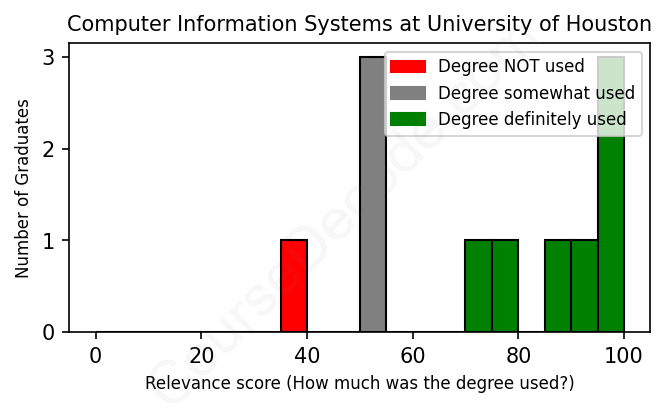
First, some facts. Of the Computer Information Systems graduates from University of Houston we've analyzed , here's how many have used (or NOT used) their degree in their career:

These are estimates based on AI analysis of 11 LinkedIn profiles (see below).
The verdict? Above average. Overall, with an average relevance score of 74%, Computer Information Systems graduates from University of Houston have a higher likelihood (+7%) of finding work in this field compared to the average graduate across all fields:
And for comparison, here's the chart for all profiles we've looked at across all degrees.
Also, after graduating, only 0% of these graduates have pursued further education other than another Bachelor's degree (such as a Masters degree or other), compared to the average across all profiles of 35%. This suggests a Bachelors degree is enough for most Computer Information Systems graduates, and it's normal to look for work straight after graduation.
See the details:
|
Relevance score: 100% We think this person has gone into a career highly relevant to their degree. We think this person has gone into a career highly relevant to their degree.
DEGREE INFOGraduated in 2021 from University of Houston with a Bachelor's degree in Computer Information Systems. No other secondary education since. JOB HISTORY SINCE GRADUATIONIT Specialist Marathon Oil Corporation Feb 2022 - Present ABOUTSkilled IT professional well-versed in assisting users with diverse computer system, mobile device, peripheralequipment and software problems. Familiar with security standards and usability optimization. Effectivelytroubleshoots and fixes technical issues while also providing excellent communication to the client. |
The top 10 most common jobs done by the graduates we've analyzed (ranked most common to least) are:
When looking at the career paths of University of Houston graduates with a degree in Computer Information Systems, it’s clear that there’s a mix of roles that are both relevant and somewhat tangential to their studies. A significant number have taken positions related to technical areas, such as SSRS Reports Developer, Application Administrator, and Analytics Consultant. These jobs directly apply the skills learned in their degree, focusing on data systems, reporting, and analysis. On the other hand, several graduates have found themselves in project management or proposal management roles. While some traits from their studies might help in these roles, they often don’t tap into the specific technical knowledge that a Computer Information Systems degree provides. This raises the question of how much their degree truly aligns with what they’re doing day-to-day on the job.
It also seems that despite the mix, many graduates are definitely utilizing aspects of their Computer Information Systems backgrounds in their roles, especially in areas that require technical problem-solving or system architecture. However, there are also quite a few who are in jobs that could just as easily have been filled by someone without a specialized tech degree. So, while a decent number of graduates are working in fields that relate directly to their education, there's a noticeable chunk where the connection isn't as strong. It’s a reminder that while a degree in Computer Information Systems can open many doors, the paths taken vary widely and don’t always align perfectly with the technical focus of their studies.
Here is a visual representation of the most common words in job titles for Computer Information Systems graduates (this is across all Computer Information Systems graduates we've analyzed, not just those who went to University of Houston):

Looking at the career trajectories of graduates from the University of Houston who studied Computer Information Systems, it’s clear that many of them have landed in solid roles related to tech and project management. For their first jobs, graduates often start off in roles that relate to application support, analysis, or project management. Jobs like SSRS Reports Developer or IT Specialist are common entry-level positions. Graduates from classes between 2011 and 2021 have moved on to various meaningful roles, showing a trend of upward mobility within fields like technology and consulting. For instance, those who began as project managers or application administrators have advanced to higher positions like Chief Architect or Analytics Consultant, often within reputable companies like Chevron and Siemens.
As for what these alumni are doing 5 to 10 years after graduating, many have shifted into leadership roles or specialized positions, which indicates a healthy career trajectory. You can see folks moving into director roles or becoming consultants, suggesting they’re building on their technical skills and gaining the experience to manage teams and larger projects. While a few paths, like the one that took a graduate from being a Consultant Agent to a Laboratory Technician, might appear less directly related, most still find their footing in tech or project management. Overall, it looks like a degree in Computer Information Systems from UH often sets up graduates for relevant and successful careers in the tech sector, which is a great sign for anyone considering this path!
Honestly, a Bachelor’s degree in Computer Information Systems can be a bit of a mixed bag, but generally speaking, it’s considered to be on the moderate side in terms of difficulty. You’ll definitely face technical subjects, like programming and databases, which can be challenging, especially if you’re new to coding. However, if you have a good mindset and are willing to put in the effort, you’ll likely find it manageable. Plus, the program usually includes a fair amount of practical experience and projects, which can help make the concepts click better. So, while it might not be a walk in the park, it’s definitely doable if you stay organized and committed!
Most commonly, in the LinkedIn profiles we've looked at, it takes people 5 years to finish a Bachelor degree in Computer Information Systems.
Looking at the job trajectories of these University of Houston Computer Information Systems grads, it seems they’ve landed some pretty decent roles, especially as time goes on. The more experienced grads, especially those from 2011 to 2016, seem to be solidly positioned in project management, consulting, and tech analyst spots with companies like Chevron and Siemens, which usually pay pretty well. The 2023 graduates are at the beginning of their careers, so we don’t have much salary info on them yet, but a lead position at H-E-B and a consultant role already look promising. Overall, it seems like many of these folks are making a good living in tech, which is great news if you’re thinking about this field!
Here is a visual representation of the most common words seen in the "about" section of LinkedIn profiles who have a Bachelor degree in Computer Information Systems (this is across all Computer Information Systems graduates we've analyzed, not just those who went to University of Houston). This may or may not be useful:

Here are all colleges offering a Bachelor degree in Computer Information Systems (ordered by the average relevance score of their Computer Information Systems graduates, best to worst) where we have analyzed at least 10 of their graduates:
| College | Score | Count |
|---|---|---|
 James Madison University James Madison University
|
89 | 12 |
 Arizona State University Arizona State University
|
85 | 10 |
 University of Houston University of Houston
|
74 | 11 |
 DeVry University DeVry University
|
67 | 20 |